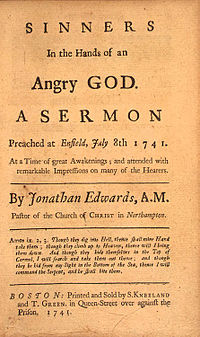
| Great Awakenings in America |
|---|
The First Great Awakening, sometimes Great Awakening or the Evangelical Revival, was a series of Christian revivals that swept Britain and its thirteen North American colonies in the 1730s and 1740s. The revival movement permanently affected Protestantism as adherents strove to renew individual piety and religious devotion. The Great Awakening marked the emergence of Anglo-American evangelicalism as a trans-denominational movement within the Protestant churches. In the United States, the term Great Awakening is most often used, while in the United Kingdom, the movement is referred to as the Evangelical Revival.[1]
Building on the foundations of older traditions—Puritanism, Pietism, and Presbyterianism—major leaders of the revival such as George Whitefield, John Wesley, and Jonathan Edwards articulated a theology of revival and salvation that transcended denominational boundaries and helped forge a common evangelical identity. Revivalists added to the doctrinal imperatives of Reformation Protestantism an emphasis on providential outpourings of the Holy Spirit. Extemporaneous preaching gave listeners a sense of deep personal conviction about their need for salvation by Jesus Christ and fostered introspection and commitment to a new standard of personal morality. Revival theology stressed that religious conversion was not only intellectual assent to correct Christian doctrine but had to be a "new birth" experienced in the heart. Revivalists also taught that receiving assurance of salvation was a normal expectation in the Christian life.
While the Evangelical Revival united evangelicals across various denominations around shared beliefs, it also led to division in existing churches between those who supported the revivals and those who did not. Opponents accused the revivals of fostering disorder and fanaticism within the churches by enabling uneducated, itinerant preachers and encouraging religious enthusiasm. In England, evangelical Anglicans would grow into an important constituency within the Church of England, and Methodism would develop out of the ministries of Whitefield and Wesley. In the American colonies, the Awakening caused the Congregational and Presbyterian churches to split, while strengthening both the Methodist and Baptist denominations. It had little immediate impact on most Lutherans, Quakers, and non-Protestants,[2] but later gave rise to a schism among Quakers that persists to this day.
Evangelical preachers "sought to include every person in conversion, regardless of gender, race, and status".[3] Throughout the North American colonies, especially in the South, the revival movement increased the number of African slaves and free blacks who were exposed to (and subsequently converted to) Christianity.[4] It also inspired the founding of new missionary societies, such as the Baptist Missionary Society in 1792.[5]
- ^ Cite error: The named reference
quotewas invoked but never defined (see the help page). - ^ Ahlstrom 2004, pp. 280–330.
- ^ Taylor 2001, p. 354.
- ^ "Slavery and African American Religion | Encyclopedia.com". www.encyclopedia.com. Retrieved 2023-05-11.
- ^ Bebbington 1989, p. 12.